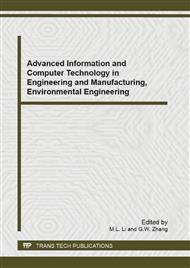[1]
Ni Jianjun. Theory and Applications of Complex Systems Modeling and Control Based on Multi-agent[M]. Beijing, Publishing House of Electronics Industry, (2011).
Google Scholar
[2]
He Yanxiang, Chen Xinmeng. Design and Application of Agent and Multi-Agent Systems[M]. Wuhan, Wuhan University Press, (2001).
Google Scholar
[3]
Michael E. Porter. The Competitive Advantage of Nations[M]. Beijing, CHINA CITIC PRESS, (2007).
Google Scholar
[4]
Zhang Dongsheng, Li Yanshuang. Enterprise Strategy Management[M]. Beijing, China Machine Press, (2005).
Google Scholar
[5]
Xu Xuanhua, Chen Xiaohong. Research of Model Administrate of DSS Based on Muti-agent[J]. Computer Engineering and Design, 2005, (13), pp.194-196.
Google Scholar
[6]
Wang Shiqing, Li Chubing. Multi-Agent-Based supply chain model and simulatin[J]. Computer Engineering and Design, 2010, 31(5), pp.1081-1084.
Google Scholar
[7]
Li Chunmei, Zou Ping. Design the Overall Framework of Enterprise Management Strategy GDSS Based Multi-Agent[J]. Systems Engineering-theory&Practice, 2002, 22(5), pp.55-59.
Google Scholar
[8]
Yang Sibo, Li Minqiang. An Intelligent Control and Decision Making Model Based on Self-Organizing Multi-Agent System[J]. Journal of Tianjin University, 2012, 45(10), pp.904-911.
Google Scholar
[9]
Sun Yongyong. Design of multi-Agent intelligent decision support system based on blackboard[J]. Electronic Design Engineering, 2012, 20(16), pp.14-16.
Google Scholar
[10]
Wooldridge M, Jennings N R. Intelligent agents: Theory and Practise[J]. Knowledge Engineering Review, 10(2) (1995)115-152.
Google Scholar
[11]
R. Bose. Intelligent Agents Framework for Developing Knowledge-based Decision Support Systems for Collaborative Organizational Process[J]. Expert Systems with applications, 11, pp.247-261, (2006).
DOI: 10.1016/s0957-4174(96)00042-5
Google Scholar


